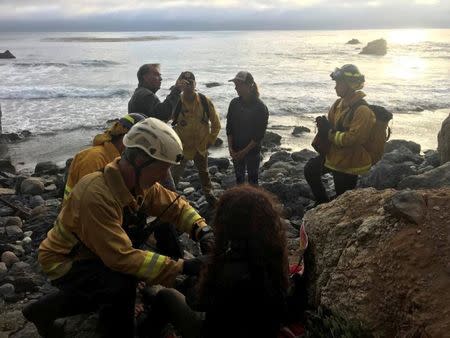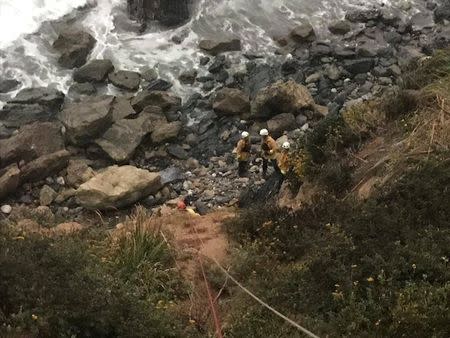Woman survives seven days on spring water after California cliff crash
(Reuters) - This July 14 story was corrected to reflect California Highway Patrol retraction of statement that Hernandez said she drank engine radiator water. CHP says Hernandez used a radiator hose to drink water from a spring.
An Oregon woman who disappeared a week ago was rescued from the bottom of a California coastal cliff where she survived by drinking water from a spring using a radiator hose from her wrecked sports utility vehicle, authorities said on Saturday.
Angela Hernandez, 23, of Portland was found by a pair of hikers on Friday evening after they saw her wrecked Jeep Patriot SUV partially submerged at the bottom of a 200-foot cliff in the Big Sur area, said Monterey County Sheriff's Office spokesman John Thornburg.
Her disappearance captured widespread attention after she and her vehicle were last seen on a surveillance camera video at a Carmel gas station on July 6, about 50 miles north of the stretch of Highway 1 where she was found.
The hikers discovered Hernandez conscious, breathing and with a shoulder injury, Thornburg said.
Rescuers managed to get her up the cliff and to a helicopter which flew her to a nearby hospital. She was in fair and stable condition but appeared to have suffered a concussion during the collision, the California Highway Patrol said in a statement.
Hernandez told investigators she swerved to avoid hitting an animal on Highway 1 on July 6 and plunged over the cliff north of Nacimiento Fergusson Road.
She stayed alive by using "a radiator hose from the vehicle to drink water from a spring," said California Highway Patrol spokeswoman Jessica Madueno.
"It's usually the fall that gets them, or the ocean that gets them, and she was lucky to survive both," said Thornburg.
Hernandez was on a road trip from her home in Portland to visit her sister Isabel in Lancaster, Los Angeles County, when she crashed.
"My sister survived 7 days alone 200ft down a cliff on HW1," her sister Isabel Hernandez said in a Facebook post on Saturday. "This is very traumatic and will be a slow recovery process."
(Reporting By Andrew Hay; Editing by Robert Birsel and James Dalgleish)

 Yahoo News
Yahoo News 


